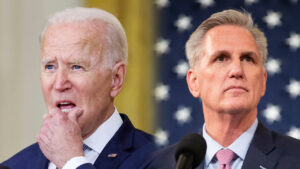WASHINGTON – President Joe Biden and Republican House of Representatives Speaker Kevin McCarthy on Monday prepared for critical debt–ceiling talks, with a little more than two weeks to go before the US government could run short of money to pay its bills.
Democratic and Republican staff were working to find common ground on spending levels and energy regulations before a 3 p.m. EDT (1900 GMT) Tuesday meeting between Mr. Biden, Mr. McCarthy and the three other top congressional leaders.
The White House has not ruled out the annual spending caps that Republicans say must accompany any increase in the nation’s $31.4 trillion debt limit.
Republicans, who control the House, have said they will not vote to raise the debt ceiling unless Democrats agree to sharp spending cuts. Failure to lift the limit — a move necessary to cover the costs of spending and tax cuts previously approved by Congress — could trigger a default that would set off a sharp economic downturn.
But Mr. McCarthy said he saw little sign of progress ahead of the meeting with Mr. Biden, Democratic Senate Majority Leader Chuck Schumer, top Senate Republican Mitch McConnell and top House Democrat Hakeem Jeffries, which comes the day before Biden is due to leave Washington to attend a Group of Seven nations meeting in Japan.
“They’re not doing well at all. There’s no progress that I see, and it really concerns me with the timeline of where we are,” Mr. McCarthy, speaking to reporters, said of the talks. “We’ve got big issues to get to, and you’ve got to get through the House and the Senate, and there’s definitely not enough progress to see that.”
Asked if Mr. Biden should leave for Japan without a debt ceiling deal in place, Mr. McCarthy told reporters: “Look, I think an American president should focus on solutions of America. And I think it shows your values and your priorities.”
Mr. Biden made no public comments on the state of the negotiations on Monday, after telling reporters on Sunday he thought both sides wanted to reach a deal. “I think we’ll be able to do it,” he said.
Mr. Biden‘s trip will leave little time for the two sides to reach a deal before the US runs out of money to pay its bills, which Treasury officials say could come as soon as June 1.
A first-ever US default would plunge the country into recession and inject chaos into global financial markets, economists say, and the standoff has started to worry investors and consumers.
BUDGET TALKS
Mr. Biden has insisted that Congress must increase the country’s borrowing capacity without conditions, but the White House says it is also willing to discuss budget matters with House Republicans.
“Our expectation is that Congress will do what is necessary even as we continue to have parallel discussions on the budget,” Lael Brainard, head of the White House‘s National Economic Council, said on “CBS on Sunday.”
Republicans face pressure from former President Donald Trump, who said they should allow the country to default unless all their demands are met.
“Better now than later,” he wrote on social media. Three times during Trump’s presidency, lawmakers raised the debt limit, a move Congress routinely needs to make to cover the costs of spending and tax cuts it has previously approved.
House Republicans passed legislation in April that pairs a $1.5 trillion debt–ceiling hike with $4.8 trillion in spending cuts, largely achieved by cutting annual discretionary spending by 8% next year and capping growth in the years to come.
Democrats say they will not agree to other elements of that legislation, such as a repeal of Biden‘s student-loan forgiveness effort and an increase in work requirements for some benefit programs.
But they have not ruled out spending caps.
Republican Representative Don Bacon, a leading centrist, told reporters on Friday that an agreement could potentially call for 2% annual increases, rather than the 1% specified by the Republican bill.
The White House and Republicans may agree to ease permitting requirements for pipelines and other energy infrastructure – though that would require time to draft into legislation, said Brian Riedl, a fellow at the conservative Manhattan Institute.
The longer the two sides take to reach a deal, the smaller it is likely to be, he said. “The field of play is going to shrink because you’re running out of time on broader policies,” he said. – Reuters

